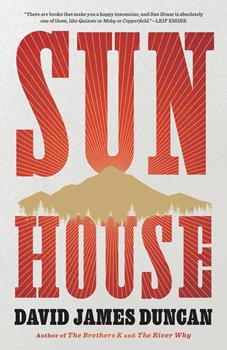David James Duncan
Little, Brown & Company

The summer before his graduate program started, Dave landed a decent-paying job at a Portland, Oregon, branch of the Pioneer Trail Bank chain. And there, at a college pal’s wedding, he met the sexy, hard-partying Irish American Moira O’Reilly. A loyal product of parochial schools, Moira was thrilled by the long-haired liberal priests of the era who held that while birth control is a mortal sin, the “rhythm method” was not a sin if confession absolved the rhythmic sinners.
from Sun House
A glimpse through the mystic’s eye
It occurred to me halfway through this book that I still didn’t know what it was “about”—a major clue that one’s reading literary fiction.
It’s been thirty years since David James Duncan brought out a novel. Devoted fans of The Brothers K (1992) and The River Why (1983) have been eagerly awaiting this book.
There is a story of sorts: A group of people living their conventionally messy lives are all seeking [FILL IN THE BLANK]—it’s hard to put into words: meaning? Connection? Transcendence? God? They will each find their own answers in their own ways: some through the Vedic scriptures of ancient India, some through the writings of medieval mystics like Meister Eckhart, some in deep encounters with mountains, others through music and poetry, even cooking.
Duncan doesn’t offer a story so much as a sensibility, examining the emptiness at the heart of people’s lives and the many different ways we try to fill it, through work or relationships, both those functional and those dysfunctional, or with alcohol and drugs, both legal and illegal, or with religion, sex, politics, video games—really, anything to distract us from the ache of the spiritual vacuum.
Through these rambling, twisting stories of contemporary seekers, he also gives us a glimpse of the mystic’s vision, how the world might have appeared to St. Francis of Assisi or St. John of the Cross, and how different it is from the way most of us see life most of the time—the un-mystic vision—lacking mystery, lacking wonder, generally oblivious to the beauty that is always before us. But then, to be fair, St. Francis never got to enjoy video games or “America’s Got Talent” either.
Some sections are inspired rants—on the commodification of the American dream, or the cruel raising and killing of animals so we can enjoy our meat (Fran Leibowitz: “My favorite animal is steak.”), or against the dehumanizing effect of capitalism that turns people themselves into commodities, or the slow, long-term killing of the planet for short-term profits.
Duncan is a “writer’s writer.” He delights in wordplay and pens gorgeous phrases that gleam and glisten on the page, such as describing those times when “we feel blessed whether we believe in a Blesser or not.”
Reading Sun House (admittedly, not an easy read) you may come away with a vision more than a story, a glimpse of what mystics through the ages saw. Hopefully, most of us at some point amid our busy lives have been granted such a glimpse, a moment of grace, of transcendence and awe, where we were able like William Blake “To see a world in a grain of sand and heaven in a wild flower, Hold infinity in the palm of your hand and eternity in an hour.”
This review first appeared in The Columbia River Reader (November 15, 2023.) Reprinted with permission.

